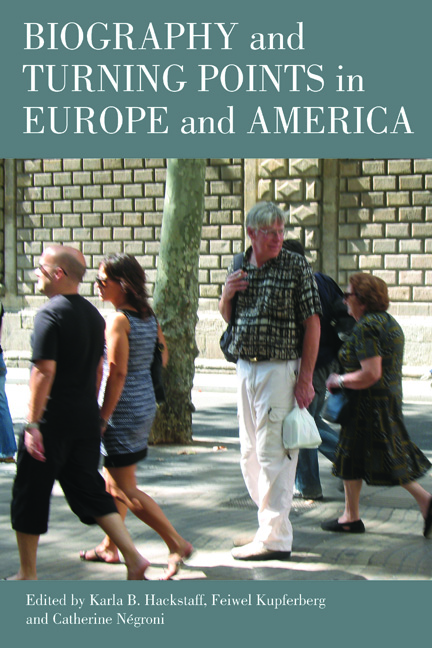Book contents
- Frontmatter
- Contents
- Notes on contributors
- Introduction: Advancing the dialogue on turning points
- one Unpacking biographical narratives: investigating stories of artistic careers in Northern Jutland, Denmark
- two Turning points in the life course: a narrative concept in professional bifurcations
- three Conjugal separation and immigration in the life course of immigrant single mothers in Québec
- four Migration biography and ethnic identity: on the discontinuity of biographical experience and how turning points affect the ethnicisation of biography
- five Biographical structuring through a critical life event: parental loss during childhood
- six Decisive turning points in life trajectories of violence among young men in the barrios of Caracas: the initiation and biographical reconversion to non-violent lifestyles
- seven The turning points of the single life course in Budapest, Hungary
- eight Complicating actions and complicated lives: raising questions about narrative theory through an exploration of lesbian lives
- nine Religious conversion as a biographical turn/ing: the case of Orthodox believers in contemporary Russia
- ten Conclusion: theorising turning points and decoding narratives
- Index
nine - Religious conversion as a biographical turn/ing: the case of Orthodox believers in contemporary Russia
Published online by Cambridge University Press: 01 September 2022
- Frontmatter
- Contents
- Notes on contributors
- Introduction: Advancing the dialogue on turning points
- one Unpacking biographical narratives: investigating stories of artistic careers in Northern Jutland, Denmark
- two Turning points in the life course: a narrative concept in professional bifurcations
- three Conjugal separation and immigration in the life course of immigrant single mothers in Québec
- four Migration biography and ethnic identity: on the discontinuity of biographical experience and how turning points affect the ethnicisation of biography
- five Biographical structuring through a critical life event: parental loss during childhood
- six Decisive turning points in life trajectories of violence among young men in the barrios of Caracas: the initiation and biographical reconversion to non-violent lifestyles
- seven The turning points of the single life course in Budapest, Hungary
- eight Complicating actions and complicated lives: raising questions about narrative theory through an exploration of lesbian lives
- nine Religious conversion as a biographical turn/ing: the case of Orthodox believers in contemporary Russia
- ten Conclusion: theorising turning points and decoding narratives
- Index
Summary
Introduction
This chapter explores the acceptability of the idea of a biographical turn in order to explain women's conversion to Orthodoxy in contemporary Russia, which has taken place in a situation of widespread mass conversion and religious renaissance in the post-Soviet period.
In order to trace representations of religious conversion as a biographical turning point (or process) I analysed Orthodox biographical narratives and religious scriptures. This chapter aims to identify typical representational schemes or ways of speaking about religious conversion as biographical experiences that exist at both individual and institutional levels, that is, at the level of biographical narrative and church discourse, and to compare them.
The following argument with regard to narratives of conversion is rooted in the assumption that a ‘real’ process of conversion and the narration about it are not the same thing. It is not important what a ‘real’ conversion is; rather, the main interest lies in the discursive principles and forms of construction and its representation. Therefore, on the one hand, a conversion story is part of the biography as a whole (as a turning point or as something else). On the other hand, it could play the role of a dominant story, and thus highlights and transforms the whole biography. In that perspective a conversion story reflects and constructs the new, that is, Orthodox, version of the life story, using for that purpose formal rhetorical devices and biographical patterns that exist in public Orthodox discourse.
Biographical studies of biographical turns
Within the biographical approach, ‘turning points of biography’ were at first conceptualised by Anselm Strauss (1959), and since then this notion has become central to studying biography. This approach pays attentions to various ways of representing turning points in the course of biography, where the main goal is often to reconstruct an ‘objective’ reality and its causation and procedure which lay behind the ‘subjective’ narrativ. Furthermore, in biographical research it is common to explore in the situation of biographical turning whether some alternative choices existed, and then to compare the realised life trajectory with an unrealised one that had a chance to be implemented (Schuetze, 1983; Bertaux and Bertaux-Wiame, 1997; and others).
- Type
- Chapter
- Information
- Biography and Turning Points in Europe and America , pp. 207 - 226Publisher: Bristol University PressPrint publication year: 2012



